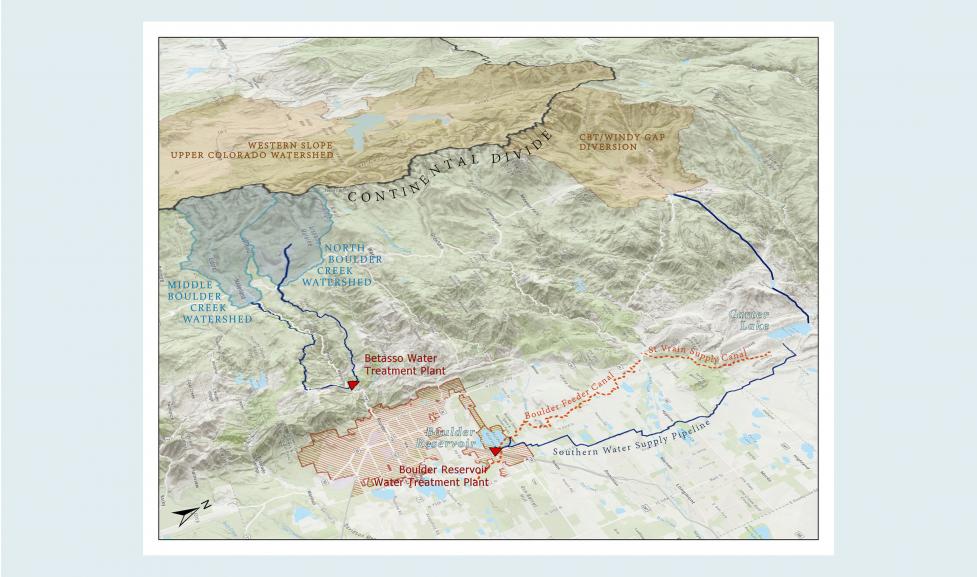The City of Boulder’s water supply is dependent on snowpack in the alpine headwaters of North Boulder Creek, Middle Boulder Creek and the Upper Colorado River.
With sources on both the east and west slope of the Rockies, our water supply is resilient to variability in weather, natural disasters and other stressors.
Our Water Supply
Barker Reservoir and the Silver Lake Watershed
The city receives approximately two-thirds of its water supply annually from direct flow and storage rights on Middle Boulder Creek and North Boulder Creek.
Each spring, melting snowpack fills the city’s reservoirs, including Barker Reservoir, Silver Lake Reservoir, and numerous smaller reservoirs upstream of Silver Lake.
Water from North and Middle Boulder Creeks and the city’s reservoirs is treated at the Betasso Water Treatment Plant. As the water moves through the city’s raw water and treated water pipelines, it also generates hydroelectric power.
Colorado-Big Thompson and Windy Gap
The remaining one-third of the city's water supply comes from the Colorado-Big Thompson (CBT) and Windy Gap projects, operated by Northern Water.
These two projects divert water from the upper Colorado River on the western slope and deliver it through a series of tunnels, canals and reservoirs to northeastern Colorado cities, farms and industries. CBT and Windy Gap water is delivered to Boulder Reservoir and via pipeline directly to the Boulder Reservoir Water Treatment Plant.
Managing Our Water Supply
The city's Source Water Master Plan is the primary guiding document that informs water supply decision-making. Other key plans and initiatives are referenced below.
Source Water Protection Program
We take a proactive approach to protecting the city’s drinking water at its source. This helps prevent contamination and minimize treatment needs and costs. The city worked with watershed stakeholders to develop a Source Water Protection Plan. This plan provides information about the city’s watershed protection activities and routine source water monitoring and evaluation program.
Water Conservation and Drought Planning
Changing climate conditions make it increasingly important to conserve water. The city’s Water Conservation Program provides a variety of services and resources to help customers use water efficiently in and around the city. This program is guided by the city’s Water Efficiency Plan.
The city’s Drought Plan provides guidance for recognizing and responding appropriately to droughts that affect water supply availability.
Irrigation Ditches
Boulder is home to many irrigation ditches, or channels, that deliver water from natural sources to homes, farms, businesses, industries and other users.
Our varied water portfolio includes shares in numerous local irrigation ditch companies. City staff work closely with ditch companies to lease irrigation water when available to support local farmers.
For more information about ditch companies and ditch maintenance, and information for homeowners and developers, visit Agricultural and Irrigation Water Leasing.
Past & Present
In 1989, Boulder City Council established level of service goals, also known as the reliability criteria, for the acceptable frequency at which the city could issue water use restrictions due to drought. The Boulder Valley Comprehensive Plan outlines Boulder’s future needs within the projected growth for the city’s water service area. Given current population projections, we expect to meet Boulder’s future water demands in accordance with those reliability criteria.
The story of our waterworks is a long and integral part of the city’s history. Learn more through Boulder's Waterworks Past and Present.
